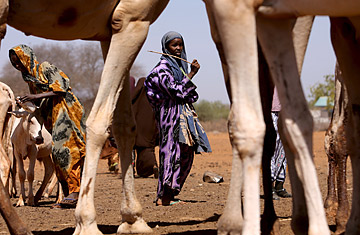
A Kenyan-Somali pastoralist herds camels to a bore-hole in Wargadud, in the arid north of Kenya where people rely on goats, sheep and camels for their livelihood.
Swimming Against the Tide:
How Developing Countries are Coping with the Global Crisis"
The World Bank
21 pages
Download
The Gist:
The World Bank said it first: in 2009, the global economy will contract for the first time since World War II. That's the banner headline of the international financial group's March 9 report, but, particularly for developing countries, the devil runs rampant through the details. (Really, when a report is titled "Swimming Against the Tide," you know there's not much good news forthcoming.) The World Bank paints a downright dismal picture of the growth prospects for developing countries, which are just now beginning to feel the full repercussions of the credit crisis that started in the United States. The World Bank expects number of people living below the poverty line to increase by 46 million worldwide, just as credit for developing countries becomes harder to secure, global trade withers, and remittance payments — the money sent home by workers overseas — plummets. Developing countries are more protected from downturns in production, but they're the most exposed to a prolonged global slowdown. The World Bank makes clear that in this recession, there's nowhere to hide. (See pictures of the global food crisis.)
Highlight Lowlight Reel:
1. On the global economic outlook: "Global industrial production declined by 20 percent in the fourth quarter of 2008 ... Global GDP will decline this year for the first time since World War II, with growth at least 5 percentage points below potential."
2. On the impact on global trade: "Falling demand in advanced economies has had serious implications for global trade, with 2009 expected to experience the first yearly decline in world trade volumes since 1982, the largest decline in 80 years."
3. On the effects of declining commodity prices on the developing world: "Many LICs [low-income countries] rely disproportionately on revenue from commodity exports, the prices of which have declined sharply along with global demand ... During the second half of 2008, non-energy commodity prices plunged 38 percent, with most indices ending the year well below where they started."
4. On the effects of a global economic slowdown on developing countries: "The slowdown in growth will likely deepen the degree of deprivation of the existing poor. In many LICs, large numbers of people are clustered just above the poverty line and are therefore particularly vulnerable to economic volatility and temporary slowdowns."
The Lowdown:
The World Bank does its best to offer suggestions to get the world out of this quagmire. That might be the only bright part in this otherwise sobering assessment — the Bank says there is "growing recognition" of the steps that need to be taken. Chief among those is the need to restore confidence in the financial system and the demand for foreign trade. Most stimulus packages are designed to meet these two needs. More difficult to swallow might be the recommendation to up the "quantity and quality" of direct aid to developing countries, an area of the budget many countries are already slashing. The report makes it clear that developing countries are desperately in need this assistance during the recession to meet basic needs, but that's the problem — as the recession deepens, everyone else needs a hand, too.
The Verdict: Skim
